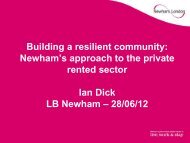View publication - Chartered Institute of Housing
View publication - Chartered Institute of Housing
View publication - Chartered Institute of Housing
You also want an ePaper? Increase the reach of your titles
YUMPU automatically turns print PDFs into web optimized ePapers that Google loves.
INTRODUCTION TO PART TWO – LEADING TOMORROW<br />
economics to understand the decision-making processes <strong>of</strong> customers both as<br />
individuals and as groups. This is being driven by the need for the housing industry to<br />
develop better approaches to customer relationship management, more discerning ways<br />
<strong>of</strong> working with diverse customers over a much broader product and service <strong>of</strong>fer; and<br />
greater personalisation <strong>of</strong> services.<br />
Resiliance – The housing industry is already witnessing growing social pressures which<br />
are emerging from public spending cuts, welfare reform and a protracted economic<br />
downturn. While we have discussed in some detail greater commercialisation in the<br />
industry; providers are also focusing on their traditional role <strong>of</strong> providing support to<br />
some <strong>of</strong> the most vulnerable and disadvantaged members <strong>of</strong> society. There is no doubt<br />
that this will exact a psychological and emotional toll on staff working with individuals<br />
experiencing very difficult and traumatic situations. This will be exacerbated by the need<br />
for landlords to ensure rents are collected. Staff will need support to develop resilience<br />
in the face <strong>of</strong> stress and adversity arising from this difficult dual role.<br />
Coaching and mentoring – A number <strong>of</strong> organisations illustrated in part two <strong>of</strong> this<br />
anthology have invested a great deal <strong>of</strong> time and effort in coaching and mentoring both<br />
staff and individuals in communities. Coaching and mentoring are ways <strong>of</strong> taking a<br />
person-centred approach to learning and skills development and developing a better<br />
understanding <strong>of</strong> an individual’s needs, motivations and aspirations. Coaching and<br />
mentoring are vital compliments to formal training and learning because they are able<br />
to address more qualitative and affective factors which determine how individuals<br />
perform in the workplace and they provide an individual and targeted approach to<br />
pr<strong>of</strong>essional development.<br />
85

















